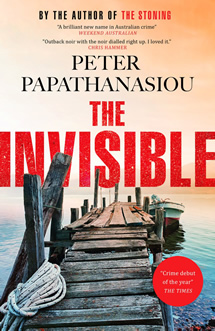Reviewed by Robert Goodman.
By Peter Papathanasiou, Hachette, $32.99.
 Peter Papathanasiou’s debut novel, The Stoning, was an Australian rural crime novel with its roots in Greece. In his follow up, The Invisible, Papathansiou only spends a short time in Australia. The bulk of the narrative is set in Northern Greece, on the border with Albania and Macedonia and it explores long standing cultural issues in the area.
Peter Papathanasiou’s debut novel, The Stoning, was an Australian rural crime novel with its roots in Greece. In his follow up, The Invisible, Papathansiou only spends a short time in Australia. The bulk of the narrative is set in Northern Greece, on the border with Albania and Macedonia and it explores long standing cultural issues in the area.
After an accidental shooting in Mebourne Detective George Manolis is ordered to take a break, and he takes the opportunity to go back to his ancestral home in northern Greece. But it is not long before he investigating the disappearance of Lefty, an old family connection. Maonlis goes undercover as a labourer, taking over the repairs of the small cottage that Lefty was living in. His investigation, though is hampered by the fact that Lefty was one of the “inivisible”. That is, he had non official documentation of any kind and lived purely through cash transactions and the black market. So the question becomes: how do you find someone who formally does not even exist? Complicating things further is Lefty’s relationships in the town where he was either loved or hated, and it seemed before his disappearance that he had borrowed money from just about everyone.
Papathanasiou obviously has a great knowledge of and affection for this part of the world. While the investigation provides some narrative spine, the heart of the book is in its descriptions of the landscape, wildlife and local people. On top of the that is the tragic history of the area that suffered from Nazi occupation, followed by a civil war and mass evacuation of the children to neighbouring countries. In fact, all of this context is much more interesting than the investigation which is fortunate as Pathanasiou gives readers no reason to care whether Lefty is found or not except that it gives Manolis something to do on his holiday.
All this serves to make The Invisible interesting and atmospheric but never particularly tense (despite a couple of wildlife-based cliffhangers) or engaging. Papanthanasiou clearly has a story to tell (he mentions in the afterward that the story of Manolis and his family reflects his own history) but unfortunately, it is not the story that sits at the centre of this novel.
Over 850 more book reviews can be found on Pile by the Bed.











